EXTENSION





Linda Sapp
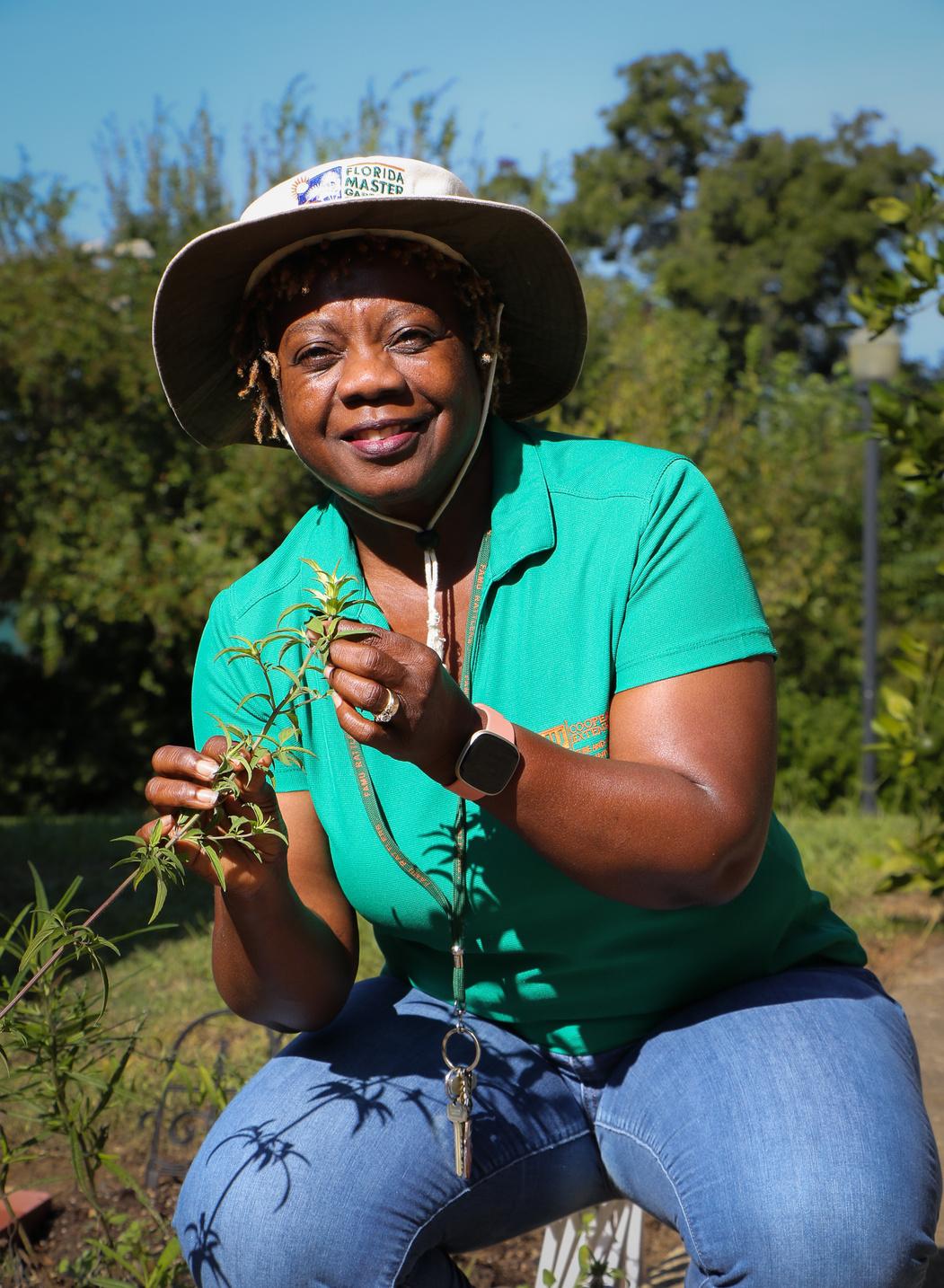







Administration:
Vonda H Richardson Extension Administratorr
Conchita Newman Associate Extension Director
An expanded knowledge base, innovations for families, farmers and business leaders, positive youth development, and community and economic opportunities are just part of FAMU Cooperative Extension’s approach to meet challenges and make contributions to the state of Florida and the world that are bold and exceed all expectations. As a unit of the Florida Cooperative Extension Service, FAMU is also a cooperative partner with USDA National Institute of Agriculture, University of Florida Institute of Food & Agriculture (1862) and state and local entities
E x t e n s i o n M a g a z i n e S u m m e r 2 0 2 3
Renysha Harris Assistant Director, Program Services
Rhonda Miller Coordinator, Program Services
Editors:
Catressa Gooden Coordinator Information Technology & Communications
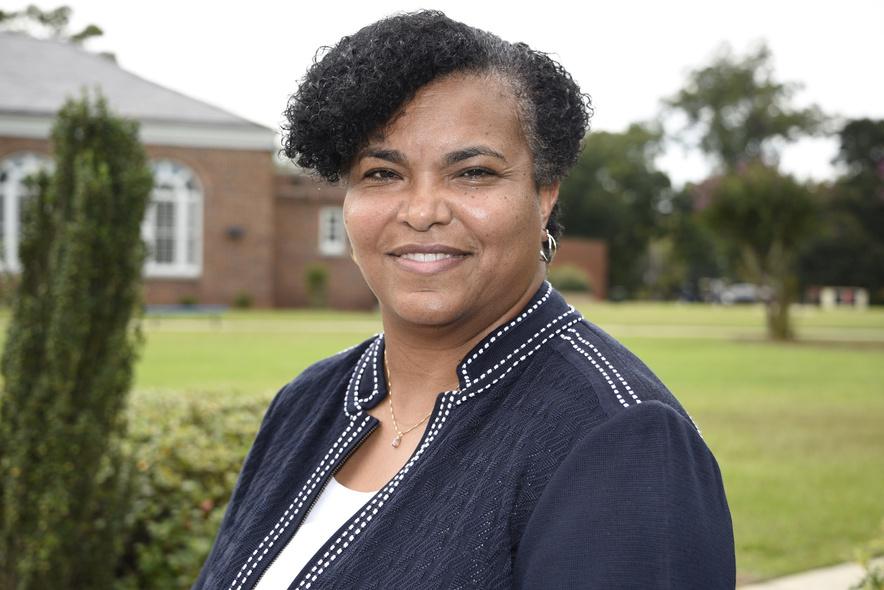
Jalen Williams Information Specialist
Contributors:
Dr Angela McKenzie-Jakes
Dr Alejandro Bolques
Dr Gilbert Queely
Dr Kentron Gibson
Linda Sapp
Kimberly Davis
Tavia Gordon
Sabrina Hayes
Samuel Hand
Trevor Hylton
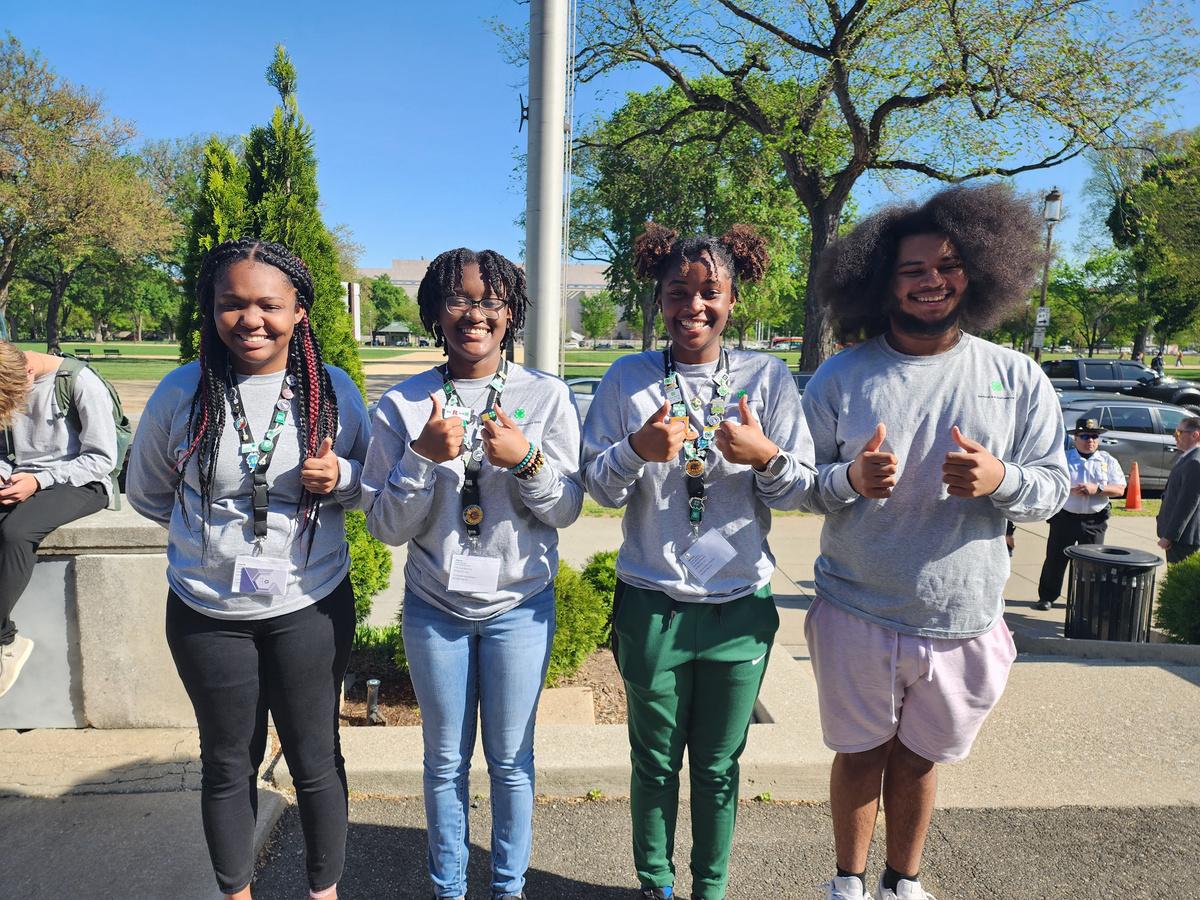
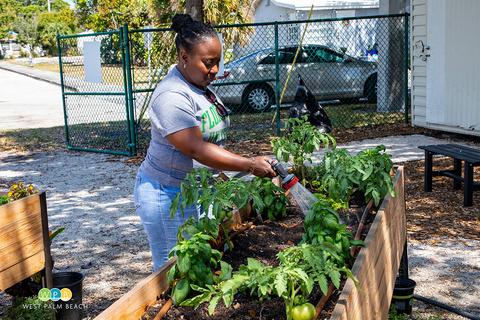
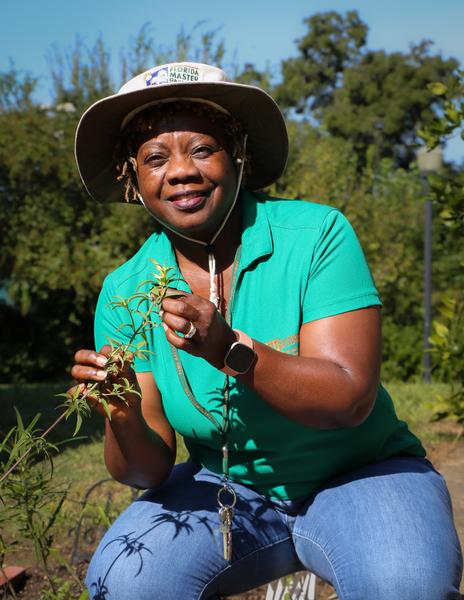
G Dale Wesson, PhD
Vonda H. Richardson
Conchita Newman
Renysha Harris
Rhonda Miller
Interim Dean & Director Land-Grant Programs & Associate Vice President for Research
Extension Administrator
Associate Extension Director
Assistant Director, Program Services
Coordinator, Program Services
Catressa Gooden Coordinator, Information Technology and Communications
Jalen Williams
Information Specialist
Cedric Spradley Information Technology
Gail Browning Program Assistant, 4-H Youth and Teleconference Center
Alejandro Bolques, PhD Center Director, FAMU Research and Extension Center & Crop Specialist
Allen Vanerson
4-H Agent, Franklin and Gulf Counties
Angela McKenzie-Jakes, PhD Small Ruminants Specialist
Barbara Floyd Expanded Food and Nutrition Education Program Assistant, Franklin and Gulf Counties
Ben Hoffner
4-H Program Assistant, Jefferson County
Carla Adams-Lippett Family & Consumer Sciences Agent
Cheyenne Martin
Crystalgale Hunter
David Jones
Dreamal Worthen, PhD
Donna Arnold
Community Resource Development Agent, Franklin and Gulf Counties
4-H Program Assistant, Gadsden County
Agricultural Assistant
Family & Consumer Sciences Specialist & Expanded Food and Nutrition Education Program (EFNEP) Coordinator
Agriculture and Natural Resources Agent, Gadsden County
Eunice Stevenson Expanded Food and Nutrition Education Senior Program Assistant
Gilbert Queeley, PhD Small Farms Specialist and State SARE Coordinator
Jennifer Taylor, PhD
Kentron Gibson
Kimberly Davis
Lester Gaskins
Linda Sapp
Nyota King-Sanyang
Sabrina Hayes
Samuel Hand
Associate Professor & Small Farms Specialist
Expanded Food and Nutrition Education Program Assistant, Leon and Gadsden Counties
Emergency Management Specialist
Community Resource Development Program Assistant
Community Resource Development Agent
Expanded Food and Nutrition Education Program Assistant, West Palm Beach
4-H Agent
Associate Professor, Landscape Extension/Industry Certifications
Sylvia Powell Expanded Food and Nutrition Education Program Assistant, Duval County
Tavia Gordon
Trevor Hylton
Urban Agriculture Agent, West Palm Beach
Community Resource Development Agent, Leon County
Walter Zanders Livestock Program Assistant
Extension Centers
FAMU Research and Extension Center 4259 Bainbridge Highway Quincy, FL 32352
4-H Youth Development and Teleconference Center 2010 Pinder Drive Tallahassee, FL 32307
FAMU Community Development and Business Center 1 Bay Ave Apalachicola, FL 32320
12 inches apart. The row can be 3-4 feet apart.

Monitor your soil moisture and water appropriately. While commercial strawberry growers use some form of irrigation, drip irrigation is recommended compared to overhead irrigation. Drip irrigation helps to reduce water usage and foliar disease Incorporate a complete fertilizer with minors at pre-planting

Consider growing strawberries in a high tunnel to help you manage water use and pest problems Our strawberries are produced under the protection of two types of high tunnel structures, low-cost and commercial Both are excellent choices for growing strawberries under the cover of plastic greenhouse film The commercial high tunnel, as the name implies, is constructed using 16-gauge steel pipes, and the low cost is built with 1-inch schedule 40 PVC pipes The materials and supplies needed to construct your own low cost high tunnel can be found in most home improvement stores

FAMU Extension spoke with Tavia Gordon, Extension Agent, West Palm Beach, Florida, to discuss the grand opening of the Coleman Park Community Garden During the interview, Ms Gordon shared some vital information about the garden, its positive impact on the community and exciting future plans
FAMUEXTENSION:Whendidthecommunitygardenopen?
VIA: The community garden ribbon cutting was on January 18, 3
MU EXTENSION: What was the process for getting the mmunity garden off the ground?
IA: When I got onboard, the garden infrastructure was ady there. We (the City of West Palm Beach personnel and elf) engaged the community through community meetings. had a meet & greet at the garden, sent out surveys, and had erson interactions with residents. We received supplies for garden, planned planting dates, and had garden days twice week and every third Saturday of each month. Persons who ed the garden did the planting, pruning, weeding, harvesting, (the whole process from seed to harvest). They are the ones help to maintain the garden.
FAMU EXTENSION: How did the public receive the opening of community garden?
IA: From the people that I have met and worked with, they eived it well They are happy with the garden because they able to get fresh vegetables and produce that they don’t e to buy at the supermarket

FAMU EXTENSION: Is there a target population?
TAVIA: No, all ages are welcome to the garden.
FAMU EXTENSION: How many people have benefited from the community garden?

TAVIA: In March, we had 14 participants. In April, there were 17 participants and 16 participants in May. So, we have had a total of 47 participants.

FAMU EXTENSION: What are the benefits of having a community garden?



TAVIA: The garden provides essential programs and fresh local homegrown produce to the residents of West Palm Beach. The northwest area of West Palm Beach is considered a "food desert”, so the community garden provides the City of West Palm Beach residents with the tools and resources to live healthier lives. The garden also serves as an agricultural training site for teaching residents how to grow food and food preservation.
FAMU EXTENSION: How has this project impacted the community?
TAVIA: The project had and is significantly impacting the residents and persons who come to the garden Everyone wants to start growing their own vegetables Another incentive for coming to the garden is that they can take home plants to start their own garden, whether in their backyard, balcony, patio, back porch, or a kitchen windowsill When they return to the garden, they show me pictures of what they are growing as a result of coming to the garden
FAMU EXTENSION: What types of things are you growing?
TAVIA: We had our first harvest of many in April. We have harvested tomatoes, basil, parsley, bell peppers, green onion, and kale. Currently, the garden has tomatoes, bell peppers, basil, zucchini, squash, eggplant, rosemary, oregano, mint, sorrel, sugarcane, lemon grass, aloe vera, thyme, and lavender.
FAMU EXTENSION: What other activities can we expect in the future?
TAVIA: We have upcoming workshops that include: Nutrition programs (youths & seniors), 4-H Youth programs, Bee Talk, Container Gardening, Grill at the Garden, Teen Talk with Police Athletic Club West Palm Beach (PAL), and CIVIC (Community Voices, Informed Choices): South Florida Food Systems, and Deliberative Discussion (FAMU & UF Cooperative Extension)

FAMU EXTENSION: How can someone contact you about the community garden?
TAVIA: I can be contacted by email at tavia.gordon@famu.edu or tgordon@wpb.org, and my telephone number is 561-804-4970.

Clean and Sanitize
Always wash your hands with soap and warm water for at least 20 seconds before and after handling raw meat and poultry.
Cross-contamination can happen even when grilling or getting food prepared to grill Be sure to wash hands thoroughly after handling raw meat Any utensils that contacted raw meat must also be cleaned Use separate plates for taking raw meat to the grill and then pulling cooked meat off the grill
The rule stays the same: keep hot foods hot and cold foods cold. Food is in the “Danger Zone” when it is in the temperature range of 40 F and 140 F. If in the “Danger Zone” for too long, bacteria can multiply to dangerous levels. Perishable foods (such as hamburgers, hotdogs, and chicken wings) should be discarded if left out longer than two hours.
Many people use cues like grill marks, color, taste, and firmness to see if their food is fully cooked. Measuring the internal temperature of meat with a food thermometer is the safest way to see if your food is fully cooked. Be sure that the thermometer reaches the thickest part of the meat, through the side, for the most accurate temperature reading.
Press Release Release No 014422
Contact: USDA Press

Email: press@usdagov

#1 ONLY USE THE GRILL OUTSIDE Keep it away from sliding and deck rails

#2
#3
USE A 3-FOOT SAFE ZONE AROUND YOUR GRILL AND CAMPFIRE This will keep kids and pets safe CLEAN YOUR GRILL AFTER EACH USE This will remove grease that can start a fire.
#4
Place your coal from the grill in a metal can with a lid once they have cooled
KNOWING A FEW FIRE SAFETY GRILLING TIPS WILL HELP EVERYONE HAVE A SAFE SUMMER!
#5
Open your gas frill before lighting
#6
KEEP AN EYE ON YOUR GRILL, FIRE PIT, OR PATIO TORCHES. Never leave any of them unattended.
Local land use planning and zoning directly affect many critical factors that shape communities, including affordable housing, access to good schools and quality of public safety. Local citizens, especially members of historically underserved groups, may feel removed from land use decisions in their communities.
Community Voices, Informed Choices (CIVIC), a partnership between Florida Agricultural and Mechanical University and the University of Florida, uses deliberative forums as its primary activity. CIVIC recognized the importance of having a diversity of perspectives in land use decisions. Through CIVIC, a pilot program was launched to engage community leadership and the public in deliberative discussions about the best ways to use land based on different approaches with various gains and losses. These discussions reflected on economic, environmental and individual needs around land use in local communities. Forums were held in three historically black neighborhoods in Florida.
As a result, we learned that partnerships with community organizations and leaders are essential to successful forums In addition, cultural and historical realities are unique and of vital importance to the discussions of land use and land use changes in these communities

 -Kimberly Davis, Emergency Management Specialist
-Kimberly Davis, Emergency Management Specialist

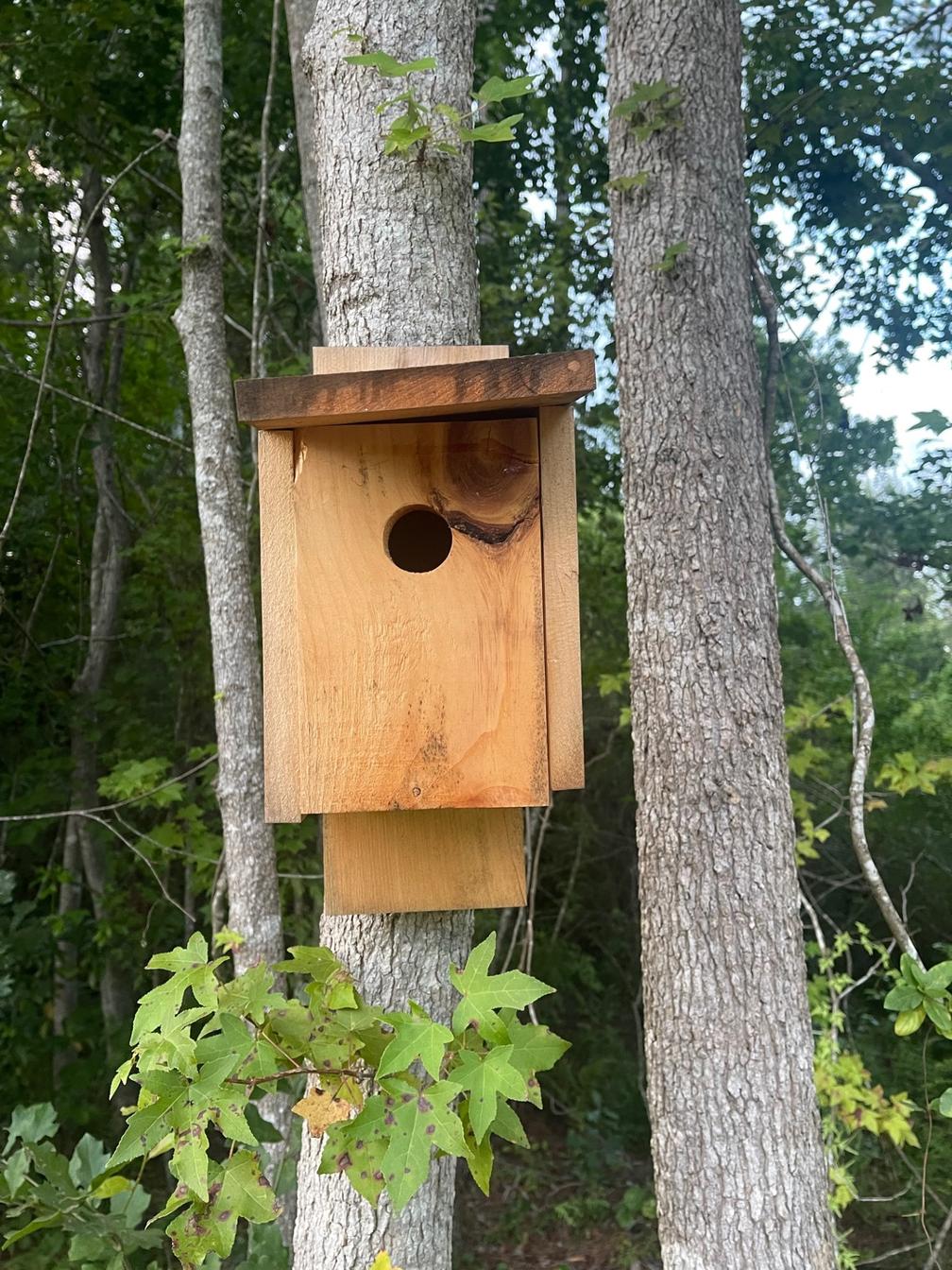
Today, we have the pleasure of speaking with Linda Sapp, FAMU Cooperative Extension Agent in Agriculture & Natural Resources, to talk about her exciting work with the 1890 Native Songbird Population Recovery Project which is part of our Senior Living extension programming Linda provided us with details about the project and the direction she would like it to go
FAMU EXTENSION: How did the 1890 Native Songbird Population Recovery Project come about?
LINDA: I attended the 2022 Association of Extension Administrators (AEA) Conference and attended a session called "Two Birds, One Stone: An Urban Environmental Science Education You Spotlight Program" with speaker Roosevelt Robinson, an Urban Regional Extension Agent from Alabama A&M University.
FAMU EXTENSION: Can you tell me a little about the session you attended at the AEA Conference?
LINDA: The session explored the fascinating world of backyards and neighborhoods, focusing on providing suitable nesting sites for declining bird populations The session covered identifying common backyard cavity-nesting birds, selecting and assembling man-made nest boxes, safely managing and monitoring nest boxes, and attracting native songbirds to your backyard
FAMU EXTENSION: In your previous response, you used the term nesting site or nesting cavity. What is a nesting site or nesting cavity?
LINDA: A nesting site or cavity is essentially a birdhouse.


FAMU EXTENSION: And how are nesting cavities built?
LINDA: The birdhouses are built by our senior program participants. After the birdhouses are complete, they are maintained at the participant's home.
FAMU EXTENSION: How are the nesting cavities or birdhouses maintained?


LINDA: The participants observed the type of bird that visited the nesting cavity. I would also check to see if any birds visited. After determining what kind of bird visited the nesting cavity and how long they stayed, the birdhouses are cleaned and ready for the next bird. We also have sessions for participants to prepare them for the next step in maintaining and managing their birdhouse.
FAMU EXTENSION: Who are the partners involved in this project?
LINDA: The partners involved in this project are the Urban Environmental Science Education Program (UESEP) and Virginia Caples Lifelong Institute of Alabama A&M University, the Smith-Williams Senior Service Center, and Florida A&M University Cooperative Extension
FAMU EXTENSION: How did you involve SmithWilliams Senior Service Center?
LINDA: FAMU Cooperative Extension has a gardening partnership with Smith-Williams I discussed the sessions addressed at the AEA Conference with them, and it was easy to approach them with the project idea I informed them that FAMU Cooperative Extension would provide the nesting box supplied, and they would only need to assemble them
FAMU EXTENSION: Will you involve more senior partners in this project?
LINDA: Yes, I am hoping to involve the Apalachicola Senior Center in Apalachicola, Florida I will be setting up a meeting with them to discuss the 1890 Native Songbird Population Recovery Project
FAMU EXTENSION: Were the seniors at SmithWilliams pleased with their man-made nesting boxes?
LINDA: The participants at Smith-Williams were quite pleased with their man-made nesting boxes.
FAMU EXTENSION: If someone wanted to contact you about the 1890 Native Songbird Population Recovery Project, how can you be reached?
LINDA: I can be reached by phone at 850-412-5258 or by email at linda sapp@famu edu
-Linda Sapp, Community Resource Development Agent

knowing how to stay safe is vital for all ages!

If your Doe's or Ewe's have just given birth, here are some tips for caring for your new arrivals. Ensure your kids or lambs nurse within the first 24 hours of life. Colostrum is the first milk produced by the doe and ewe. It is enriched in protein, fat, vitamins, minerals, and antibodies called immunoglobulins, which provide passive immunity to the offspring. If the female cannot produce milk, provide the kids or lambs with a good quality milk replacer that contains colostrum. At 2-4 weeks of age, the offspring will begin to ingest solid foods and nibble on grass, and as they grow, offer high-quality forages and supplement with feed or concentrate as needed. Unfortunately, young ruminants (goats and sheep) are extremely vulnerable to internal parasites, respiratory infections and diarrhea, so adequate nutrition is necessary to develop and maintain a healthy immune system. It is the body's defense against disease-causing organisms. Keep the herd's housing and bedding clean, provide fresh water daily, devise a biosecurity program for your farm, and develop a rotational grazing system for the animals. Some farmers rotate their animals on a scheduled basis. However, the quantity or quality of the forages should help to determine when the herd should be moved to a new pasture.
If you have problems with high mortality rates on your farm, always consult with a veterinarian (i e , deworming, vaccinations) if one is unavailable in your area that cares for small ruminants (goats and sheep), network with other experienced farmers, develop a relationship with your local livestock extension agent and attend training courses offered through the FAMU Cooperative Extension to learn how to care for them Finally, monitor the health of your animals daily and maintain good production records to determine who should remain in the herd after weaning
Weaning is the process of removing the offspring from its mother to help the young animal develop their digestive system and become self-sufficient In general, lambs are weaned between 8-16 weeks of age, and kids at 8-12 weeks The appropriate time to wean will also depend on the animal's age, weight, overall health, and the producer's goals Kids and lambs can grow into healthy and productive adult animals with proper care and management.
Other factors that determine how frequently to move the animals include the following:
Weather conditions (i.e., severe rainstorm vs. drought).
Grazing height of the foliage.
Herd size
Number of paddocks available for grazing.
-Dr. Angela McKenzie-Jakes, Small Ruminants Specialist




The National 4-H Council hosted the ultimate teen summit IGNITE. High school-aged 4-Hers from across the nation joined together in Washington D C for a 4-day experience where teens connected, collaborated, innovated, made memories, and found their spark by exploring the best 4-H has to offer in STEM, Agriscience, Healthy Living, Career Readiness and Emotional Well-being.

Teens created reflective self-portraits to leave their mark, explored the hydroponic hype and crafted hydroponic planters from recycled materials, celebrated their uniqueness with sharable photos or GIFs, and learned all about eating in equity. Teens also met with industry leaders and discussed how to solve wicked problems and how their career paths could be a part of the solution FAMU presented Resin8 fun with UV resin, where youth created art using UV resin Over 100 teens participated in the Resin8 workshop.
-Sabrina Hayes, 4-H Agent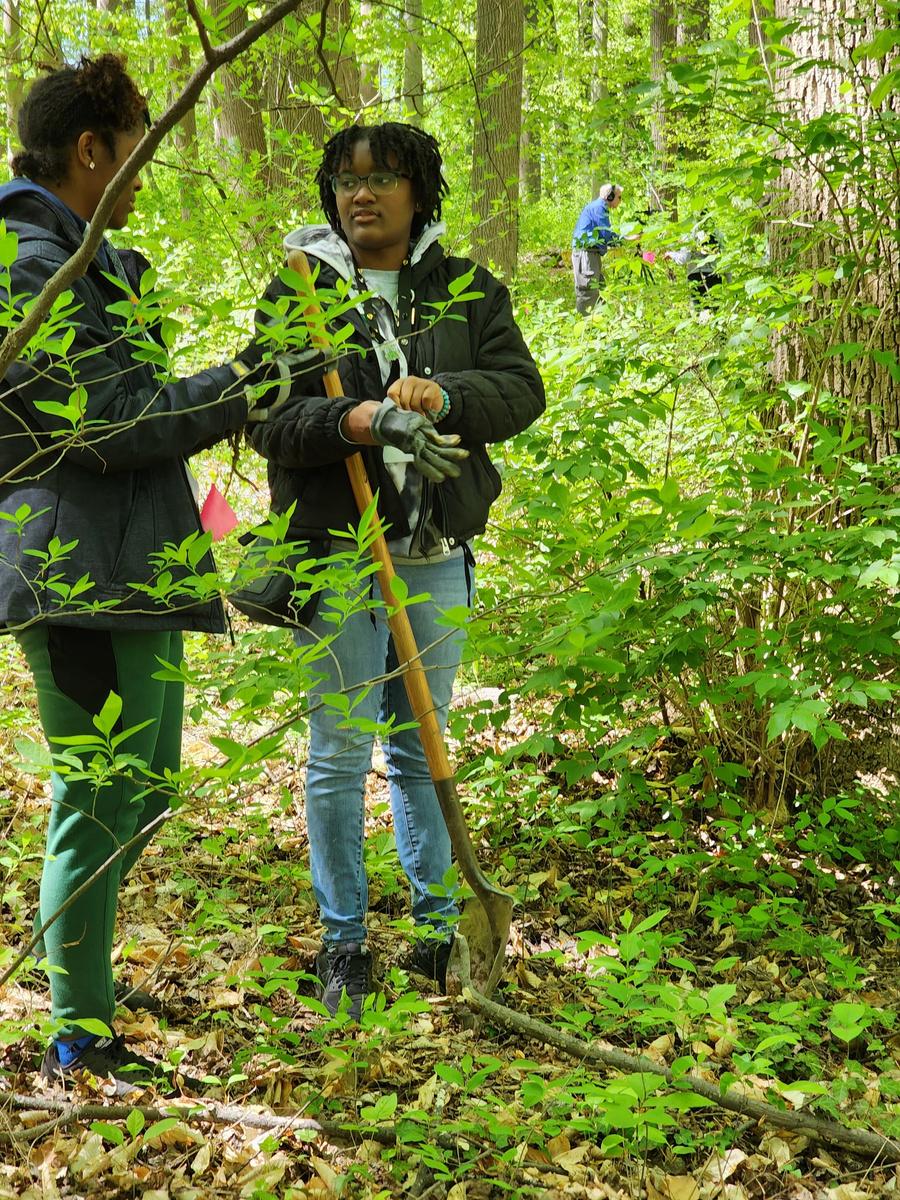

4 - H

FAMU 4-H Extension Agent, Sabrina Hayes, discusses 4-H Day at the Capitol in Tallahassee, Florida. Sabrina talks about the wonderful experiences the 4-H youth encountered and what the event is all about

FAMU EXTENSION: What kind of event is 4-H Day at the Capitol?
SABRINA: 4-H Day at the Capitol is an event for 4-H youth, 4-H professionals, and 4-H parents, friends, and volunteers to meet at the Florida Capitol Courtyard in Tallahassee to talk to legislators and senators to show what 4-H has done throughout the state.
FAMU EXTENSION: How often does this event take place?
SABRINA: It is a yearly event It used to take place in February However, it has recently been changed to April because students could not meet with legislators in January and February because they were in session
FAMU EXTENSION: What role does FAMU Extension play at 4-H Day at the Capitol?
SABRINA: FAMU Extension and the University of Florida Extension jointly plan for this event. FAMU Extension conducts a campus tour as part of 4-H Day at the Capitol, so anyone interested in touring the campus can sign up for a campus walking tour.
FAMU EXTENSION: What awareness were you trying to bring to legislators?
SABRINA: 4-H is rooted in agriculture. However, there are lots of different projects that 4-H'ers do, so when they meet with legislators, they talk about the various projects they were involved in and why they are passionate about 4-H. Students also asked legislators to fund more to 4-H youth programs like Tech Changemakers. More funding helps bring awareness to technology, and the program allows the youth to teach it in communities.
FAMU EXTENSION: Roughly how many youth associated with FAMU 4-H participated in the 4-H Day at the Capital event this year?
SABRINA: This year, about 225. We usually have second graders from Bond Elementary. This year the FAMU DRS high school class made their first appearance to participate in 4-H Day at the Capitol, so we were excited about that. Hopefully, other schools we do activities with will participate in next year's 4-H Day at the Capitol.
FAMU EXTENSION: What activities did the youth participate in at 4-H Day at the Capitol?


SABRINA: There was a welcoming ceremony, and afterwards, 4-H'ers took pictures on the Capitol steps. Since our programs are research-based, the researchers set up stations with activities related to different projects. For example, Entomology had an activity table setup. Food & Nutrition was also present, showing the youth how to make healthy snacks. A photo booth with volunteers was also available. Life Science had handson activities, and New World Initiative was there to give books to students. Overall, there was a wide range of arts and crafts activities for the youth.





Preparing your landscape for hurricane season requires thinking ahead To keep your yard and home safe when high winds come, keep hurricanes in mind when planning your gardens, planting new trees, and doing regular home maintenance. If your yard and home are well taken care of and wind resistance is considered, you will be in a much better place when storms do arrive.

Choosing and keeping the right trees and shrubs for your landscape is important for long term tree health and safety Certain species or cultivars of plants, Bradford Pear for example, are inherently prone to failure Removing them from the landscape or, better yet, never planting them in the first place, will significantly improve the chances of minimizing storm damage
Choose plants that are size-appropriate for your landscape. Don’t rely on excessive pruning to keep plants reduced to the desired size. Excessive pruning can lead to poor branch structure with weak branch attachment.
Look up as well as around when placing plants in the landscape Never plant trees and larger shrubs under power or utility lines Utility companies have the obligation and right to remove or reduce the size of plants interfering with their lines The work typically is done by subcontractors, and all do not have the experience and/or knowledge to do it correctly Many times the offending trees are simply cut off several feet below the utility lines This practice of ‘hat-racking’ or ‘topping’ creates more problems than it solves The often vigorous regrowth is weakly attached to the main trunk and branches and is very wind susceptible
Routine maintenance on your trees and shrubs can prevent undue damage to home and property. Regardless of the strength of the storm, a hurricane is very likely to tear off any dead, decaying or damaged branches which could become projectiles and cause damage Properly prune plants by removing unhealthy branches in late winter or spring Just before a hurricane is not the time to prune unless you have some place to dispose of the plant debris which otherwise could become dangerous projectiles If you have fruit-bearing plants in your landscape, consider harvesting fruit prior to a hurricane, because even a small fruit can become a dangerous projectile at high wind speeds
All plants benefit from regular maintenance and pruning, but do not confuse ‘hurricane pruning’ with maintenance. Hurricane pruning, especially on palms (Figure 1), involves the process of removing the majority of leaves with the mistaken idea that the plant will become more wind resistant, when in fact it becomes more susceptible to storm damage. Over-pruning significantly reduces the plants’ ability to produce the food (sugars) produced by photosynthesis.
Check the drainage in your yard and slope any mulching and fill away from your home to minimize the risk of flooding or foundation damage. Check any storm drains, culverts, and water retention areas, cleaning up debris or litter so storm water can flow as quickly and easily as possible. Turn off your irrigation system a few days prior to a storm’s arrival. Most storms and hurricanes are accompanied by significant amounts of rainfall. Wet soils do not grip the plant roots as well as dry soil can and lead to trees falling during and even after the storms.
Check all gutters and downspouts to be sure they’re firmly attached to your home and clear of debris and clogs. Be sure the slope of downspouts is appropriate to keep water draining, and use splash guards or downspout extensions to move excess water away from your home’s foundation. Remove all tools, furniture, potted plants and decorations from your yard before a storm. Secure small, loose items in a shed or garage. These items, if left out, can become projectiles. Larger items that cannot be brought inside should be secured or firmly staked down. Close and secure any shed or outbuilding doors.


Remove all tools, furniture, potted plants and decorations from your yard before a storm Secure small, loose items in a shed or garage These items, if left out, can become projectiles Larger items that cannot be brought inside should be secured or firmly staked down Close and secure any shed or outbuilding doors
Do not drain your pool High soil water levels actually can ‘float’ a pool causing it to heave and rise above the existing grade Water weighs nearly eight pounds per gallon and will hold the pool in place
Hurricanes can be a stressful time for homeowners, but with a little planning, you can minimize the dangers and risks to people and property a little bit of body text
-Samuel Hand, Associate Professor, Landscape Extension/Industry Certifications


1 16oz can corn
1 16oz can black beans
2 2oz pouches of chicken
1 16oz can of tomatoes/Rotel or Salsa
1 teaspoon black pepper
1 teaspoon garlic powder
1 teaspoon onion powder
1/8 teaspoon cumin, optional
1/8 teaspoon chili powder, optional
1 8oz Mexican Cheese Blend*
INSTRUCTIONS:
1 Mix in large bowl Sprinkle with grated cheese (if it’s been properly stored in refrigerator or in a cooler)
2 Serve with tortilla chips or low sodium crackers Can also serve as a wrap in corn or flour tortilla shell

2 cups of freshly squeezed lemon juice
1 1/2 cup sugar
8 cups of water
1 cup of chopped mint leaves with stems
2 lemons, sliced with garnish
1 gallon pitcher


In a gallon pitcher, combine freshly squeezed lemon juice, sugar and water, stirring until sugar has dissolved Incorporate mint mix to extract the oil and flavor
Garnish with mint leaves/lemons slices and serve over ice.
 *Photo courtesy of garnishandglaze.com
*Photo courtesy of garnishandglaze.com
Kentron Gibson, a Program Assistant for the Expanded Food & Nutrition Education Program (EFNEP) since 2018, graduated from Florida A&M University His primary responsibilities include teaching the benefits of healthy eating and nutrition to youth in grades K-12, but he loves teaching2ndand3rdgradeinparticular

In Spring 2023, Kentron Gibson graduated from Florida A&M University with a Doctorate in PhysicalTherapy

"I plan on practicing physical therapy in the state of Florida either in hospital care or in an outpatient clinic. In addition, I am currentlyresearchingoptimalmethodsfor learningandteachingwiththegoalbeing to return to FAMU in the future to aid in training the next generation of black and browntherapists"

If you want a quality program to enroll your young person in, try FAMU4-H. 4-H is a youth development organization that empowers young people with the skills to lead for a lifetime. Through FAMU 4-H, kids can participate in handson learning activities in various fields such as agriculture, STEM, healthy living, and civic engagement. They can also join local clubs, camps, and after-school programs to connect with peers and mentors who share their interests and passions.
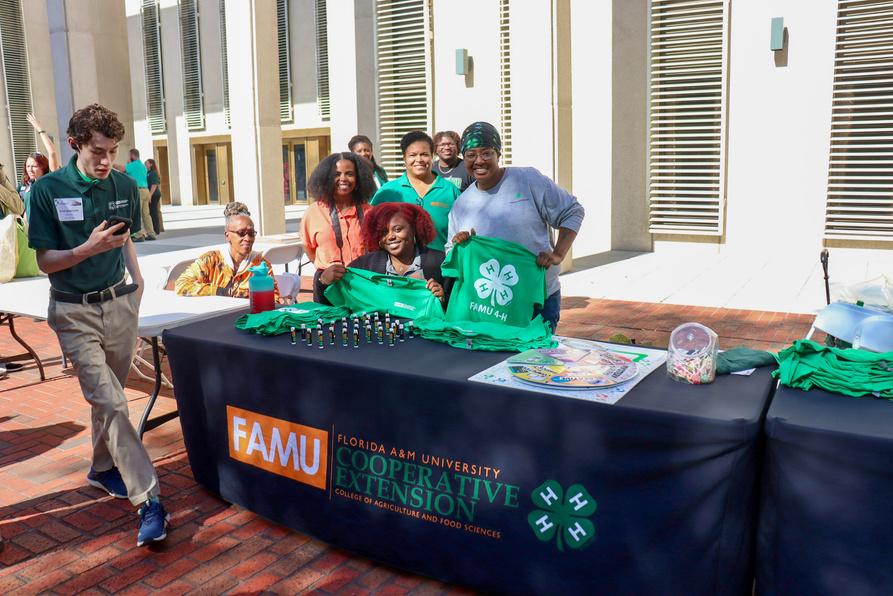
It helps kids develop confidence, creativity, and life skills to help them thrive in the future.
It exposes kids to diverse opportunities and challenges that will broaden their horizons and inspire them to pursue their goals.
It fosters a sense of community and belonging among kids who can support each other and make a positive difference in their surroundings.
It encourages kids to be curious, adventurous, and resilient learners who can apply their knowledge and skills to real-world problems
It celebrates the uniqueness and potential of every kid regardless of their background, culture, or abilities.
4-Hisacommunityforallkidswhowanttogrow,learnandlead.
By joining 4-H, kids can discover their spark and ignite their future. To join FAMU 4-H, go to https://v2.4honline.com/







